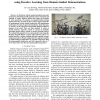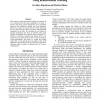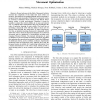425 search results - page 4 / 85 » Using Stochastic Grammars to Learn Robotic Tasks |
CVPR
2003
IEEE
14 years 10 months ago
2003
IEEE
Video-based recognition and prediction of a temporally extended activity can benefit from a detailed description of high-level expectations about the activity. Stochastic grammars...
JMLR
2010
13 years 3 months ago
2010
Probabilistic grammars offer great flexibility in modeling discrete sequential data like natural language text. Their symbolic component is amenable to inspection by humans, while...
ICRA
2010
IEEE
13 years 6 months ago
2010
IEEE
In the future, robotic surgical assistants may assist surgeons by performing specific subtasks such as retraction and suturing to reduce surgeon tedium and reduce the duration of s...
FLAIRS
2004
13 years 10 months ago
2004
Robots that can adapt and perform multiple tasks promise to be a powerful tool with many applications. In order to achieve such robots, control systems have to be constructed that...
ICRA
2009
IEEE
14 years 3 months ago
2009
IEEE
— Recent advances in the field of humanoid robotics increase the complexity of the tasks that such robots can perform. This makes it increasingly difficult and inconvenient to ...




